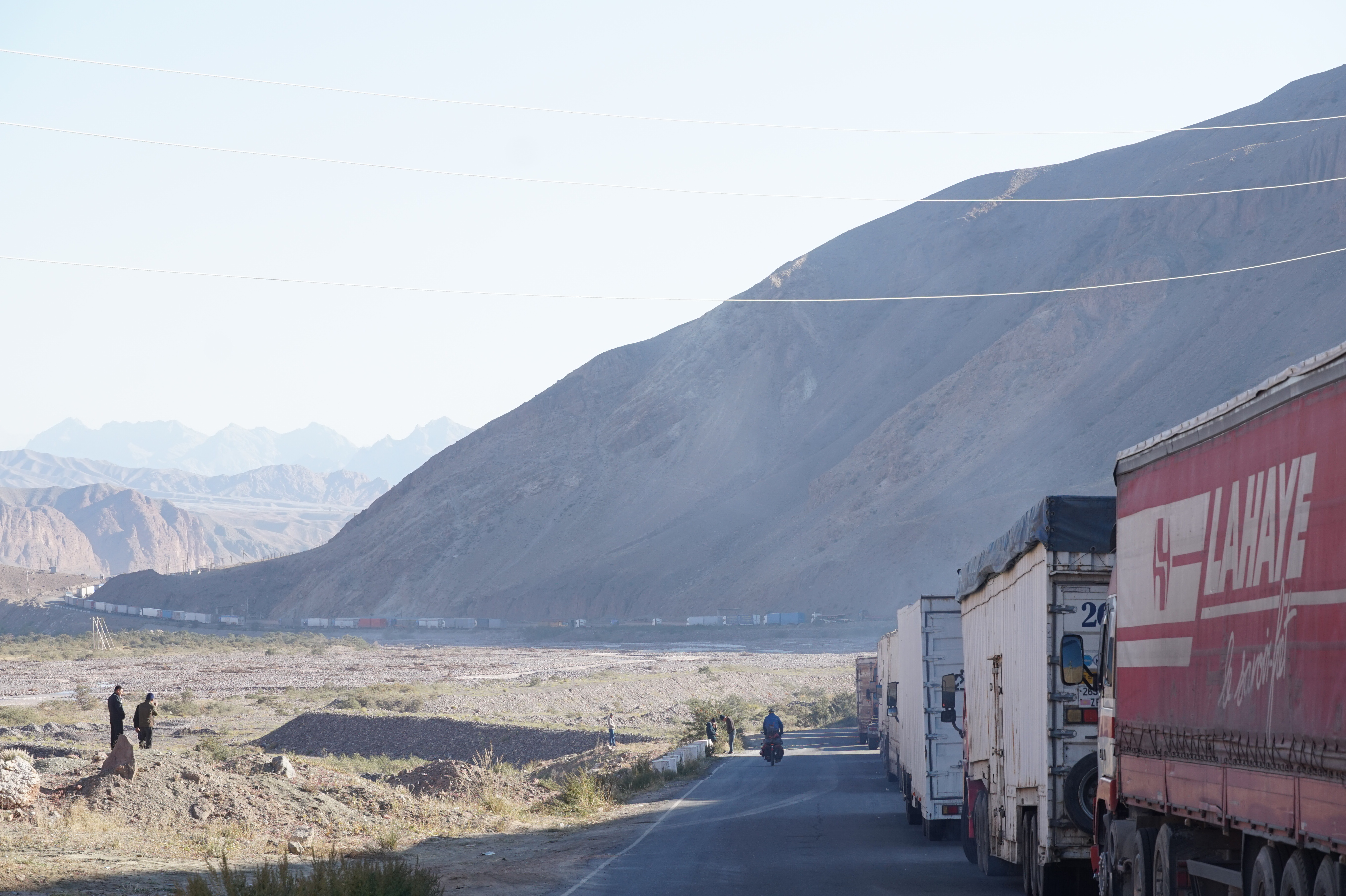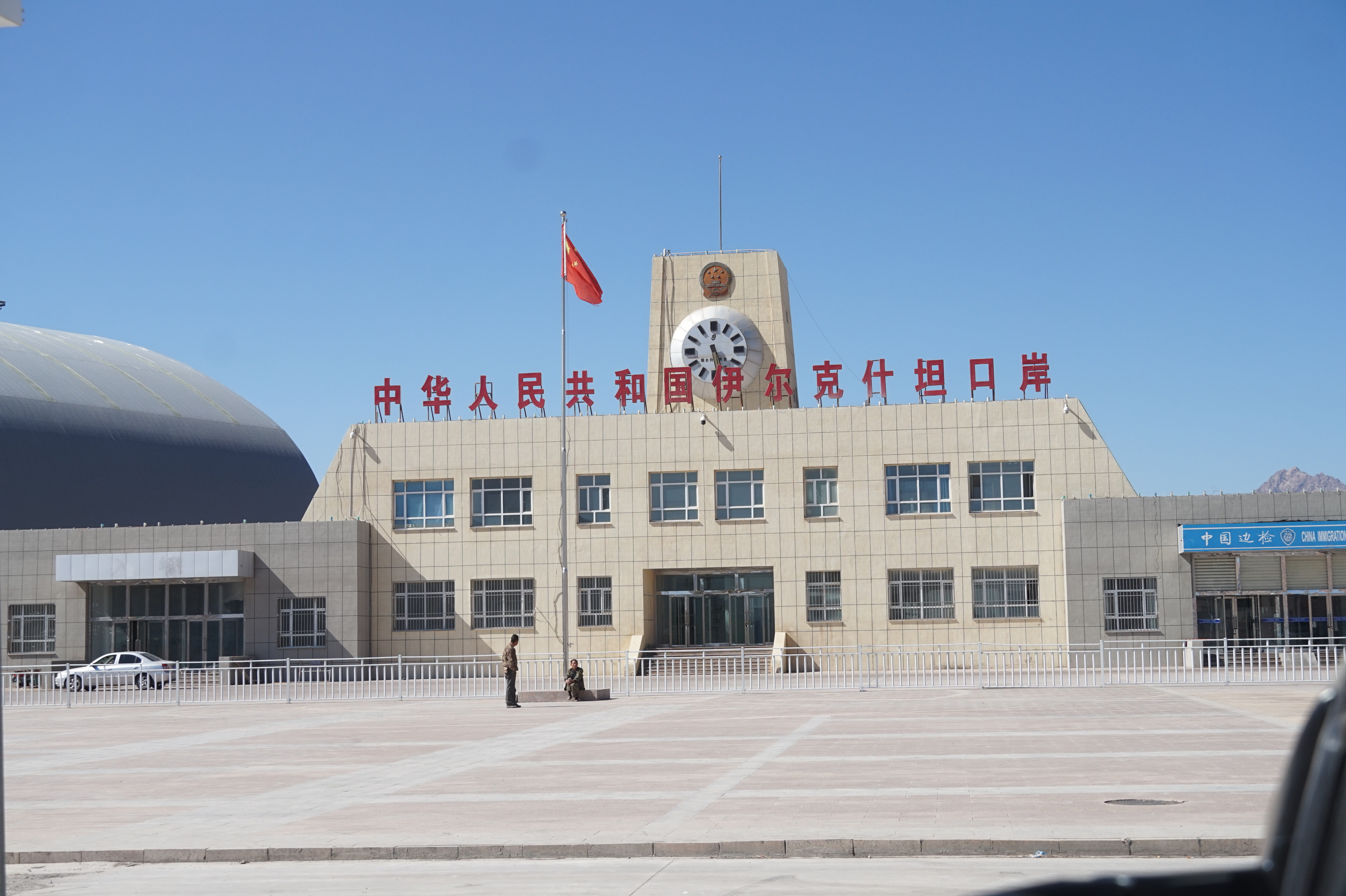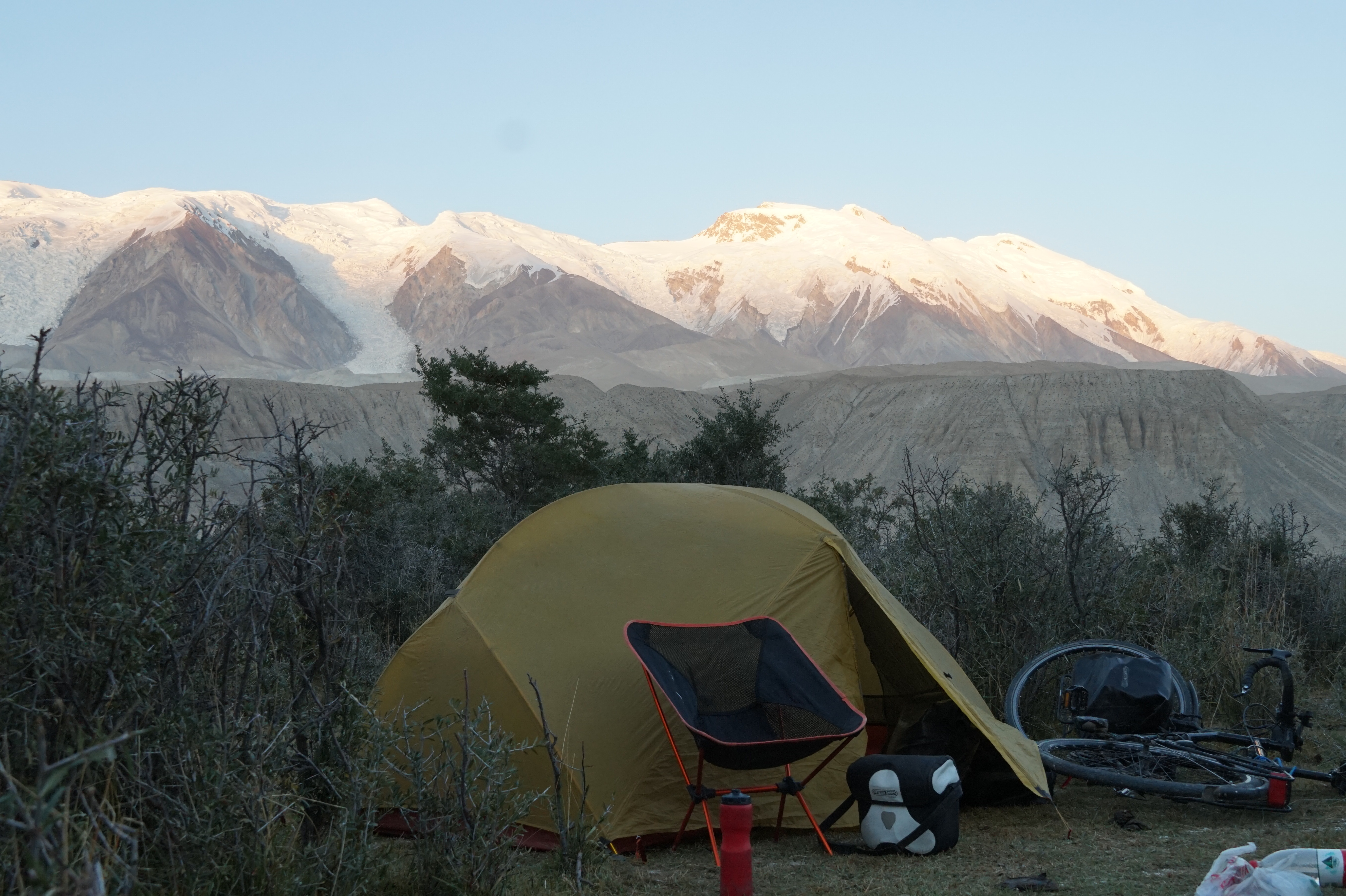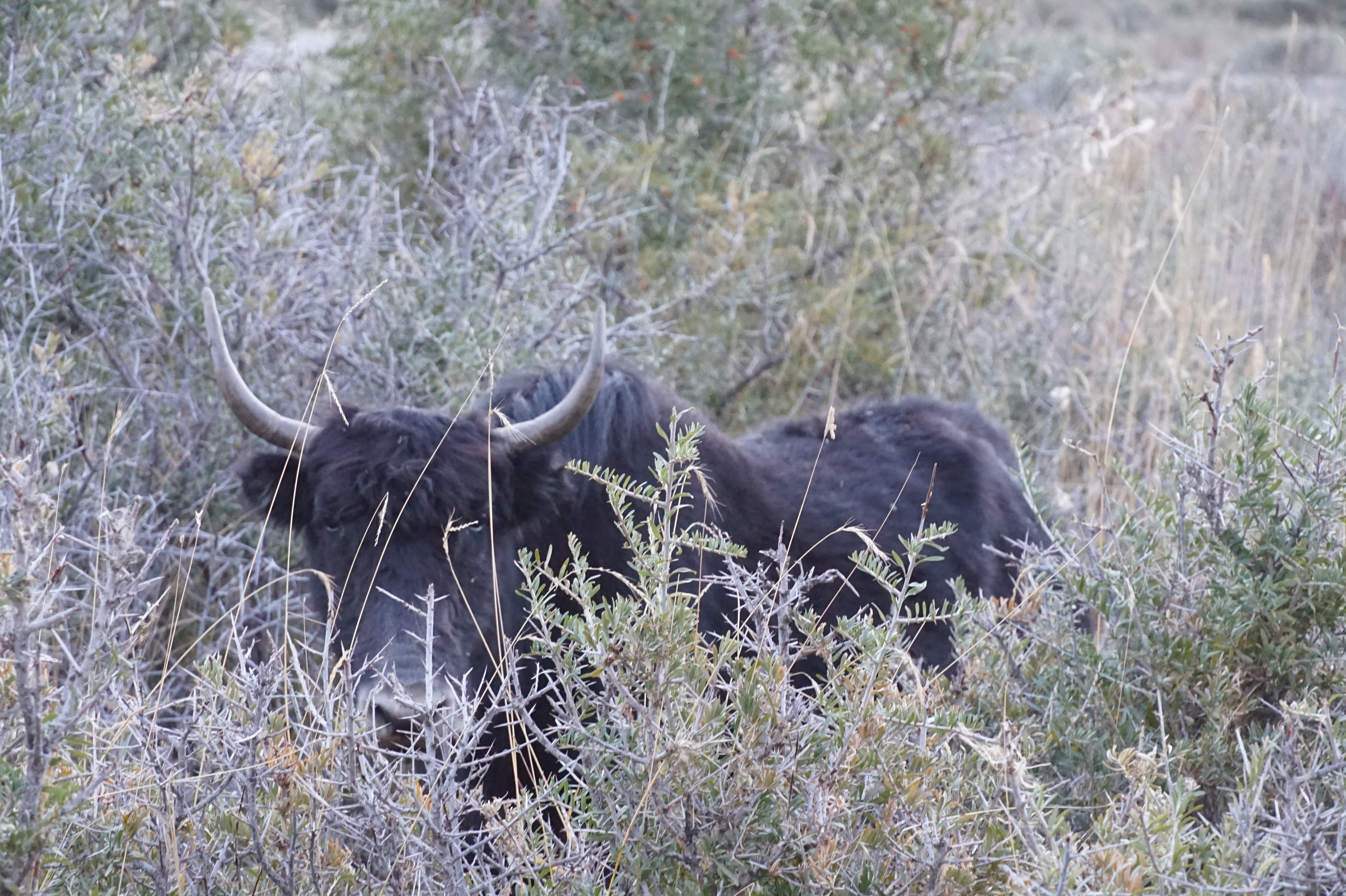Cutting through China
January 14th, 2020
My wheels violently rotated as I freewheeled down towards the Irkeshtam border crossing. The wind launched me forward at a speed of 78 km/hr (48.5 mi/hr) as the road grew steeper and steeper. I couldn’t help but break the peaceful silence of the freshly snowed mountainscape as I cheerfully whooped into the distance, adrenaline filling my numbing face. Rounding a corner, my elation was halted by a line of semi trucks and squealing brakes. The line followed the road and snaked for miles. Hundreds of trucks occupied the road with no sign of movement. I took advantage of my cycling privilege to weave my way through this mechanical labyrinth. Friendly Kyrgyz drivers with plenty of time on their hands waved me to join their morning cup of tea, but I sped on, eager to reach the end of Central Asia.

I was stamped out of Kyrgyzstan and approached the Chinese immigration accompanied by a German cyclist, Thomas. The simple Kyrgyz roads became more militarized as we rode through no man’s land. A high fence topped with threatening barbed wire and suspicious security cameras every twenty meters surrounded the road. A group of young Chinese officials—excessively armed with bullet proof vests, helmets, riot shields, and taser sticks—probed us and our intentions. Our visas likely never would have been obtained had we been truthful of our intentions to travel in the Xinjiang region, but that didn’t matter now. The officers seemed satisfied with our answers to their questions spoken in broken English, and they let us on to the immigration office, the first of many challenges.
The immigration office was modern with high tech equipment—an unusual contrast to the wooden shack checkposts I’d grown accustomed to. We stripped our bicycles naked and unloaded our gear onto an x-ray scanner. Meanwhile, the officials motioned us to step into a full body scanner. Any unapproved movement was met with disapproving glares and herding back into line. When I asked for a bathroom, an official walked with me inside and waited for me to finish.
Once the scanning was complete, our panniers were taken to a table to have every item of ours individually inspected. This was a lengthy process, and the officials didn’t seem to enjoy questioning me on every dirty and innocuous item I owned.
“That’s a wrench. I use it to fix my bicycle.”
“Oh that? If you unfold it and set it up it turns into a camping chair.”
“Yes I know my sleeping bag is quite smelly. You wouldn’t happen to have a washing machine here would you?”
When they came across my phone, laptop, and camera, I was required to unlock and give free reign over them.
“That computer program does look quite suspicious, doesn’t it? It’s called a torrent client. I use it to download movies. You know, Avengers. Iron man! Don’t worry, It’s completely legal in America.”
“Oh that man in the photo with me? He’s Azerbaijani. I don’t suppose you’d be singling him out because his complexion resembles that of a certain minority group in your country, would you be?”
This process dragged on for at least another half an hour. When they weren’t looking, I slid one pannier to the “finished” pile. Best not to even bother explaining why I have a bottle full of gasoline with me.
Finally, we were deemed fit to continue on to the “real” immigration office, a separate building 150km away. However, we were told we could not cycle there and would need to take a van across the next stretch of land. The elusive entry stamp into China acted as our pot of gold at the end of this bizarre rainbow.

Heaving our bicycles into the van, we set off down the now pristine Chinese roads. We had entered China, but we hadn’t really entered China, our passports handed over to some man who would hopefully be returning them to us at some undetermined time. This 150km stretch was completely off-limits to everyone but the police and the local inhabitants. I peered out the window to see small villages surrounded by prison-like fences with gates heavy enough to halt a tank. Even a tightly compact children’s playground was lined with the ubiquitous barbed wire fences. This all served as a poignant reminder to the sensitivity of the region I was embarking into.
Xinjiang has recently taken international spotlight for many morally questionable actions performed by the Chinese government. Quarrels between the police forces and the minority muslim Uyghur population have led to a heavy police state in the region, and, recently, “re-education” camps have been cropping up with the goal of changing the political thinking of detainees, their identities, and their religious beliefs. Accusations of cultural genocide abound from critics. I was walking a fine line by being in this region and was determined to remain extremely sensitive to these matters. (Further reading)
We passed through a highway checkpoint where facial and fingerprint scans were taken. Thomas was reprimanded for taking photos of the surrounding area and was forced to delete the photos from his phone. Eventually, we came to what we hoped to be the final point in-between us and our entry. More x-ray and body scans were taken as we entered a relaxed seating area with two other regularly-clothed men. The men approached us with a friendly demeanor and used translation apps to ask us questions about our journey. When they left, Thomas whispered to me saying they must be some sort of intelligence agents. I was skeptical of this at first, but my naivety was confirmed when I saw one of the regularly clothed men whisper to the immigration official as he pointed at me, immediately followed by the immigration official asking me to come with him for questioning. As I followed the official, I turned back to see Thomas laughing at me as he stamped into China; he earlier branded my American passport as a target. After a bit more questioning, I managed to convince the officials that I was not a spy, nor nefarious journalist, nor a foreigner bent on inciting uprisings. One more facial scan for good measure, and I at last heard the thud of the entry stamp in my passport.
We set off on our bicycles the next morning towards the city of Kashgar. The way was an easy and steady descent. Our elevation dropped as the temperature rose—much welcomed after such a long time of consistently being above 3000m (10000ft) in altitude. It felt odd to be let free after the laborious process of entry to the country, but we would quickly find out that we weren’t exactly free. Police checkpoint after police checkpoint came as we rode on, each taking a frustrating amount of time. Our passports were duly inspected, page by page, by every single police officer in the stations. When they finally ran out of police officers to look over our passports, they would quickly remember that they had two police friends from a nearby city who would also love to see our passports, phoning them to come on over and join the fun. I really couldn't imagine what they were all looking for as they paged through; I’m sure a majority of them couldn’t even read the Latin alphabet. Whatever it was, thankfully none of the many police officers found it.
As we neared the city, an urban sprawl consumed us. We experienced a reverse culture shock as we rode over smooth bridges and highways, stopped at traffic lights, and took solace in separate lanes for scooters and bicycles; levels of this infrastructure where unheard of in Central Asia. We finally reached a hostel and quickly located the fridge full of Tsingtao, a common Chinese beer.
Kashgar was a city rich in culture and history. It served as a strategic stopping point and trading post along the Silk Road for most of its history, and remnants of this time period were common, especially in its historic old city. Today, a blend of mainland Chinese and Uyghur culture are apparent in the languages, food, and ethnic diversity of its people. I enjoyed wandering around this city for a few days indulging in cheap street food and modern supermarkets. Even more so, I enjoyed being just another pawn in the urban sprawl, no longer a spectacle to be seen. A brief break from: “Hey everyone, come look at this crazy foreigner on a bicycle.”. I enjoyed just being ignored.
After stocking up on food and finishing a few repairs to the bicycle, it was time to continue on. I parted ways with Thomas and set out solo for Tashkurgan, a city serving as the entry point to Pakistan. The police presence declined as I slowly climbed back to my familiar habitat of high altitude mountains. Pulling over in search of a midday rest, I spotted an Uyghur family waving me over to have a chat. After the ritual questions of who, what, where, and why, they invited me into their home for lunch. The mother was ecstatic to give me the grand tour of their humble abode. The small, old rooms were generously decorated with traditional Uyghur paintings and furniture. They led me to the eating area and sat me down on the familiar low-raised table. The family brought out many items of subpar tasting, but much welcomed food as they introduced me to their giant extended family. Everything was incredibly reminiscent of Central Asia and in stark contrast to that of mainland China. I felt privileged to get a peek into the life of these people experiencing such persecution in their own lands. As the family waved me off with a parting gift of a large bag of fruit, I wondered whether or not the Han Chinese would be so ready to give the same unconditional hospitality that had been so abundant during my times in Central Asia.
I rounded to the top of the day-and-a-half climb back above 3000m. With the flattening of the land came a gale aimed at my back, heaving me forward along the road. Unfortunately, the setting sun quickly put a damper to my whimsical and slightly dangerous cycling. I pulled off the road into a nearby marsh to seek out a camping spot. The marshlands were home to many mellowed out camels and yak strolling along. They’d stand as statues staring at me and lazily chewing their grassy meal. Only if I’d come within a few feet of them would they go running off scared. I somehow managed to find a clear spot to set up camp in between all of the piles of excrement and hunkered down for a cold night, the alien-like moans and grunts of the nearby animals soothing me to sleep.


The next morning I awoke early to have plenty of time to cycle. Somewhat arbitrarily, I had earlier set a goal to reach Tashkurgan by this night. As I made my way down the dusty road, the previous day’s gale turned against me. I crawled along with sand and dust crashing against me like waves crashing on a shore. The road suddenly shot up and over a nearby 4000m (13000ft) mountain. I pulled over at the bottom of this mountain pass and propped myself up behind a rock formation, already thoroughly exhausted. I watched as cars slowly winded up the pass and tried to muster up the motivation to make my way up as well. The wind still howled against me and the altitude was taking its toll on my breathing. Then, a car full of Han Chinese tourists stopped by to greet me. They didn’t speak much English, but they were more than happy to gift me a shopping bag full of snacks. Spurred on by this generosity, along with an adrenaline shot of Red Bull, I gleefully raced up the pass with more Chinese tourists cheering me on as I summited.
Despite the effort I put in, I still had a long way to go to Tashkurgan. It would have been easy to call it a day and finish the ride later, but I had set myself a goal and felt obligated to complete it. On a trip like this, one quickly discovers that the heights of their discipline and confidence are much farther reaching than they ever imagined. But, these heights are not obtained by simply going through the motions. Without a framework in place with which to consistently challenge yourself, complacency sets in. This long term bicycle ride, in general, forms the overarching structure to this framework for me, but, as time goes on and kilometers fly by, the criteria for challenge shifts. I no longer struggle to cycle 100km in a day. I am no longer terrified to spend the night in a hospitable stranger’s home. By setting these ever-increasing goals for myself, I am both reinforcing this framework and ensuring that I continually explore the depths of my conviction. So, as my body rebelled and the nighttime sky set in, I pushed on through the darkness towards Tashkurgan and Pakistan, and, most importantly, towards achieving a goal.
Set before yourself an aim, a goal, a 'to this end', an exalted and noble 'to this end'. Perish in pursuit of this and only this - I know of no better aim of life than that of perishing, animae magna prodigus, in pursuit of the great and the impossible.
- Freidrich Nietzsche